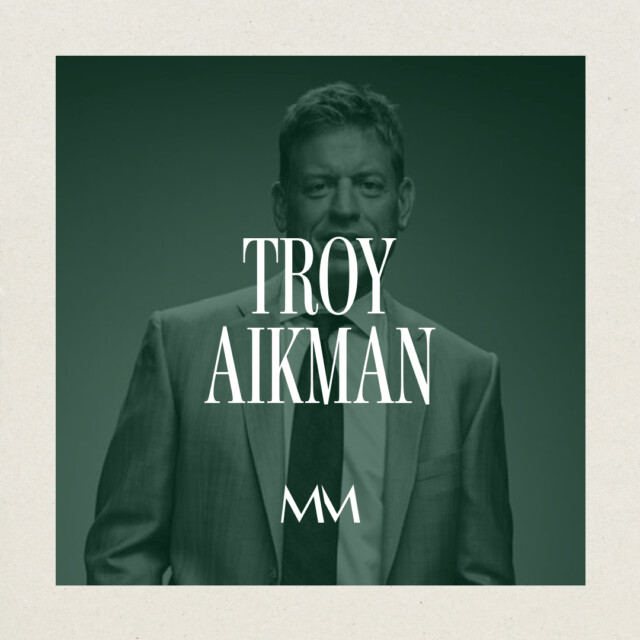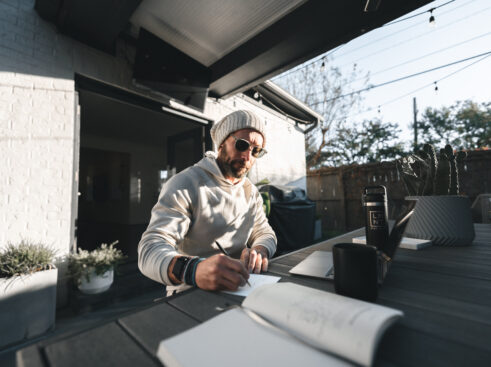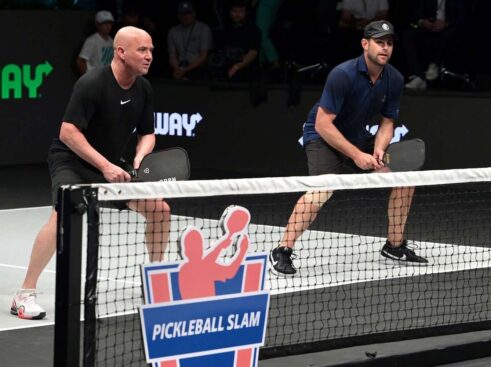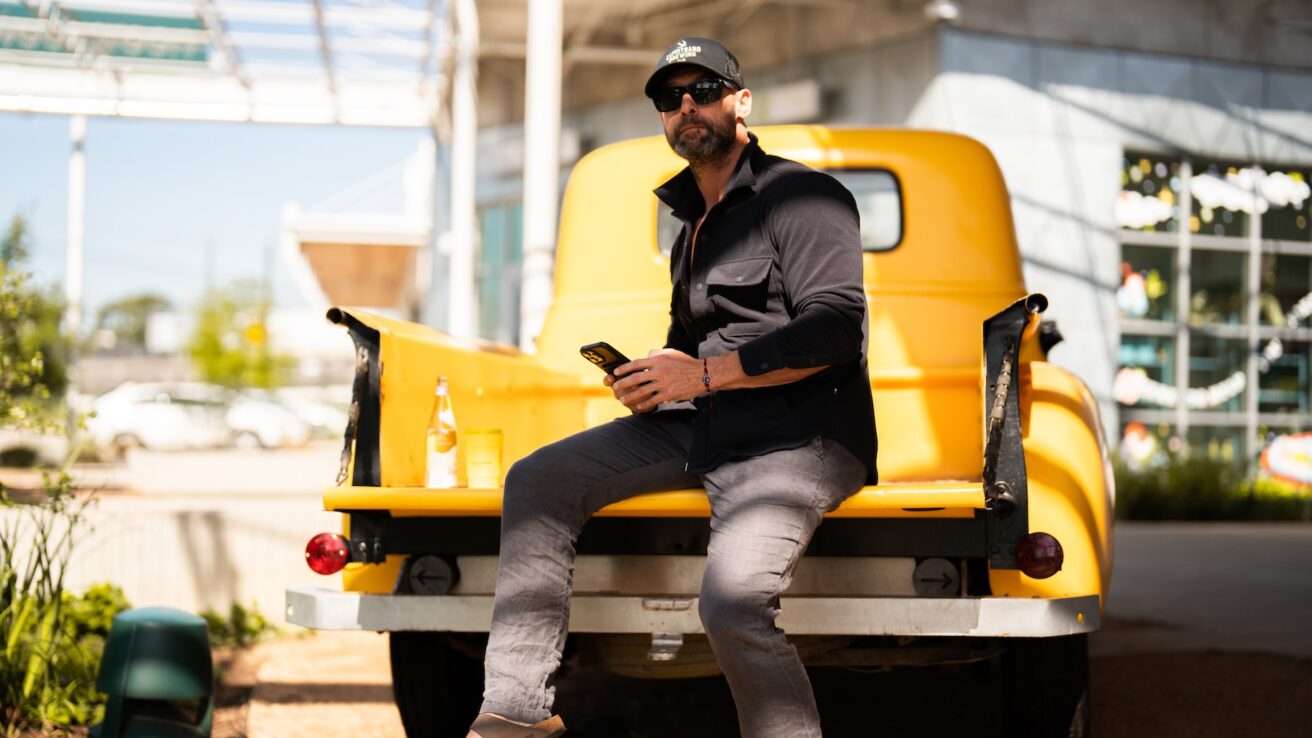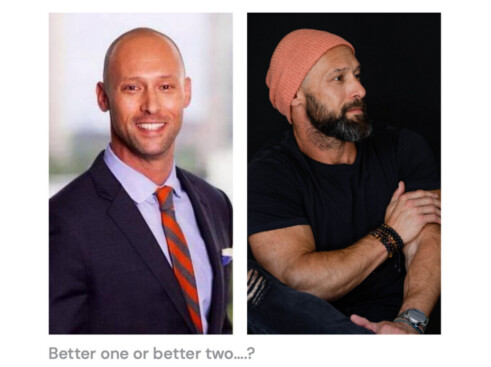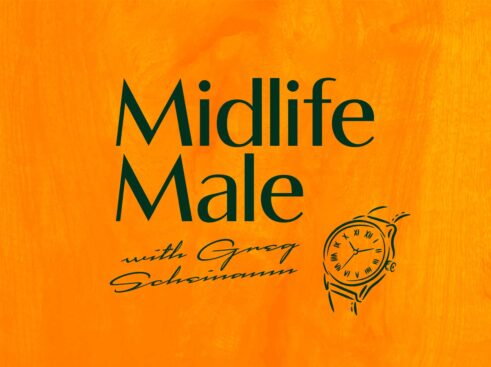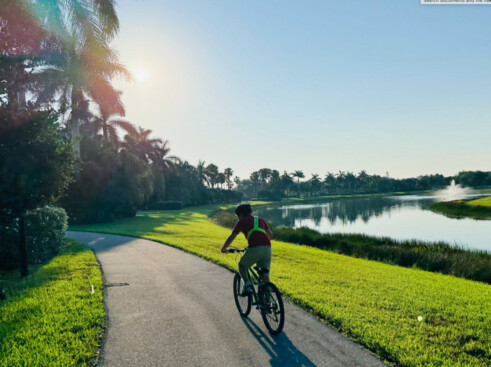On my tenth anniversary with my firm, I was in my office’s parking lot in my reserved spot.
The sun was shining, and it was a beautiful day for a million-dollar producer. And I started to cry. I couldn’t move, I couldn’t breathe, and I couldn’t get myself to go inside.
I was paralyzed. I was 47 years old, the same age as when my father passed away, sitting in my car trying to piece together all these things in my life.
It was a moment of painful clarity, staring at my own reflection in the rearview mirror, seeing not just the face of a 47-year-old man but the embodiment of unfulfilled potential and regret.
How I drank my way through college, wrapping several cars around trees, got my first job with Harvey Weinstein in my 20s, and told him to ”fuck off” twenty years before the Me Too Era, not even because he was such an asshole but because I couldn’t be controlled.
I started my own production company and produced two successful films. Then, I ended up in Houston, built a sports video company, and sold it to Michael Eisner in my 30s. I had a wife, kids, and adult responsibilities and obligations that I did an awful job managing due to my constant struggles with alcohol and self-destructive destructive behavior.
And then there was my brother going to prison, and my mother…
I imploded.
I thought that the money, career, stability, security, and benefits of tucking my tail between my legs and transitioning from risk taker and often reckless entrepreneur to a responsible, risk-managing executive was what I was supposed to do next.
I became a partner in a large insurance firm, chasing salary and title, something I thought I’d never do. I built a big book of business and finally had success by all the societal and masculine metrics, from the outside looking in, at least, although I didn’t feel any of it.
I was getting up, getting dressed, and going through the motions each and every day. I’d thought that following the “path” would help me feel better about myself; instead, all of this felt like conformity, complacency, and redundancy, and I was settling instead of striving.
I’d settled into the career, the two private school tuitions, two fancy cars, a club membership, and the friends I had acquired through Little League, schools, and our small, incestuous community, and I felt bored, unfulfilled, and trapped.
I didn’t look, feel, or act like me anymore. Looking around at everyone I spent my time with, they all looked the same.
What did all of these things have in common?
Mediocrity.
And mediocrity is really scary, and once you accept it, malaise sets in.
The day I realized my life was steeped in mediocrity was both the worst and the best day of my life.
This wasn’t just about feeling stagnant in a career or longing for superficial signs of success; it was deeper, more personal. It was the realization that the dreams and aspirations of my youth, individuality, and passion had somehow slipped through my fingers, leaving me to wake up each day to a life that felt decidedly average.
For years, this feeling of mediocrity was my silent companion.
It was there in the mirror every morning—a reminder that, despite all outward appearances of success, I was just going through the motions.
Live Fast, Die Young, and Leave a Good-Looking Corpse
I’ve never told the truth about this.
I speak publicly about how my life changed in the parking lot at 47, but it actually started much earlier. January 16th, 1992, to be exact.
I was in my dorm room at the University of Michigan when I got the call from my mother. I was expecting the call but had hoped it would never come. “Greg, it’s time to come home”.
I grabbed my pre-packed bag, raced downstairs, and into a cab to Detroit Metro to hop a Northwest Flight to LaGuardia, into another cab to North Shore Hospital on Long Island, and arrived just in time to hold my father’s hand and look into his eyes as he took his last breath and passed away.
I’ve never recovered from that moment. My father’s last words to me were, “Greg, I want to live”…And there was nothing I could do to help him.
It rocked me to my core. I not only lost my father and my best friend that day; I lost my confidence, my security, and my will to live on my own.
I wasn’t ready to be a father figure to my younger brothers, and I wasn’t ready to be the man of the house for my mother.
I’d actually only just gone off to college, and I was relieved to be able to escape.
Even years later, when I got married and had children, I still wasn’t ready. I had no one to ask for help on how to actually live, or at least I felt like I had no one to ask.
I was rudderless. From 17 to 47.
That’s 30 years.
Thirty years of recklessness, narcissism, ego, aggression, anger, resentment, embarrassment, confusion, insecurity, and loneliness.
And I was just making it up all that time as I went along; I never dealt with any of it.
And it came at a cost: Relationships, friendships, money, career health, family.
Especially when there’s no accountability.
For those first 17 years of my life. I experienced no hardship whatsoever.
I grew up in an upscale community where there was nowhere to go but down, doing everything fast, loose, out of control, and with no ramifications for my actions.
When my dad passed away, my life became a different kind of racing and chasing; only this time, it was to outrun my grief and trauma.
I’d adopted this “live fast, die young, and leave a good-looking corpse attitude.” I didn’t care about anything because I had lost what I thought was everything.
I left a lot of collateral damage in my wake, operating that way for a long time. And yet, somehow, I was fortunate at the same time when I could start businesses; I produced some movies and then had a video company. Things got done in this kind of reckless, fearless, chip-on-my-shoulder manner.
I didn’t have great mentors. And if they were around, I wasn’t open to them anyway. I didn’t know how to ask for or accept help. I thought that was a sign of weakness that I had to go it alone.
And I was wrong.
How To Maximize
Looking back at how I arrived at mediocre, it started with that call. But it became a reality with a belief.
The belief that my best days were behind me became a self-fulfilling prophecy. The vibrant aspirations of my earlier days faded into the background, replaced by a midlife acceptance of how things were. It wasn’t just that I was living a life devoid of passion and purpose; I had begun to believe this was all there was for me.
You’re not the man you thought you’d be and that you want to be, and your health, happiness, fun, confidence, and quality of life are taking a hit because of it.
You want to get back some of the things you’ve lost.
For me, I couldn’t outrun my trauma.
I’d created businesses that really never filled my tank.
I worked for a company that really didn’t care about me.
I’d spent years trying to measure my life against a memory.
The thing about mediocrity is that it can actually look pretty good from the outside looking in, but when you peel it back, it reveals a lot of small, poor choices that permeate your life over time.
Staying too late at the office and missing my kid’s games, drinking a little too much and too frequently, not exercising and taking care of myself, racing out of the house in the morning to be the first one in the office, spending a little too much money because I’m working so hard and “I deserve it,” not investing enough for the future because I’m trying too hard to keep up appearances in the present.
The decision to transform my life that day in the parking lot was born out of a deep-seated yearning for something more—a desperate desire to feel alive again, to not squander my father’s memory but embrace and honor it.
I realized that if I wanted to escape the grip of mediocrity, the change had to start with me.
I had to want it for myself, not for accolades, not for recognition, not for wanting to honor my father’s memory or make my boys or my wife proud, but for the simple joy of waking up each day feeling like I was truly living, not just existing.
I knew why I wanted to transform my life. I just didn’t know how.
I learned that just as I was choosing to make poor choices each day, the day you start making better choices is when you start feeling better about yourself.
That’s it. Full stop.
Maximization is misunderstood because it becomes overwhelming and pushes you in the wrong direction, only digging you deeper.
Maximization is not about the outcome.
It’s not for anyone else, about anyone else, or to compete or compare yourself.
It’s on you, for you, about you, and by you. Nobody else.
Gone are the days of the traditional construct—marriage and a couple of kids, a job at a company for 30 years or more, and then a pension and a comfortable retirement.
But here’s the kicker: by taking ownership of your life, decisions, choices, and actions, you show up better for everyone and everything in your life.
This journey of transformation is deeply personal and emotional. It’s about confronting the painful truth of what it means to look in the mirror and not like what you see—not just on the surface, but deep down, where it counts. It’s about facing the fears and insecurities of acknowledging that you are the only one responsible for your happiness.
But more than anything, it’s about hope—the hope that comes with realizing that your best days are not behind you but ahead of you, waiting to be seized.
It’s about understanding that the day you stop feeling mediocre is the same day you start making changes—the day you start taking those small, consistent steps towards leading a life that feels not just lived but fiercely, passionately maximized.
Deciding to transform is not about negating the past but about building on it, learning from it, and moving forward with a renewed sense of self. It’s about recognizing that feeling maximized is not a destination but a journey that requires you to be present, make conscious choices, and take deliberate actions that align with who you want to be.
Here’s what I did:
“Time to go to work.”
That’s what I told myself.
That’s it.
On my 47th birthday, I’d made it longer than my father had, and I had a choice.
I could squander the rest of my life or pour rocket fuel on it.
I decided that I was going to work on myself. I had known all the “why’s.” Why I wanted to be in better shape, why I wanted to be a better husband, father, and man, why I wanted to look, feel, earn, dress, and do everything better. I just didn’t know how.
That started me on a journey. To transform myself from mediocre to maximized.
I redefined what success looked like. I stopped chasing salary + title and developed my 6F”s (Family, fitness, finance, food, fashion, and fun) as my metric for success and began to pursue total life wellness. These are the things that matter
I developed five rules that I live by based on 200+ interviews that I’ve done with the world’s highest-performing middle-aged men.
- Knowing what’s important is what’s most important – that’s my 6F’s.
- If you don’t know where you’re going, you’ll never get there – that was my MAP to transition out of my business and into.
- Aggregate, curate, eliminate – ACE – Aggregate from all the info I was taking in, curate down to what works best for me, and eliminate the rest.
- Show me your calendar, I’ll show you your priorities – what we schedule and get done.
- Grace, gratitude, and latitude: We are too hard on ourselves. Extend some kindness to yourself along the way.
I ask myself a simple question every day: Better one or better two? I’ve learned that success is all about the choices you make and actions you take, and when you make the better choices, the majority of your life gets better.
I realized that Mediocrity happens by default. Maximization happens by design.
I designed and wrote my MAP (Midlife Action Plan). Then I began to reverse engineer back to what actions I needed to take to make the vision a reality and create my personal operating system, the daily standards, and things I do daily.
Think of the MAP as the why and the operating system as the how.
The most impactful thing I did was not even about what I started doing but what I stopped doing. That’s the first step!
I stopped:
- drinking
- staying out late
- sleeping in
- consuming mindless content
- complaining
- saying yes and giving away my time
- comparing and competing with everyone
None of this was working for me. None of it fits into the MAP or the operating system.
Once I stopped these things and started stacking up these daily little wins, tremendous opportunities – time, energy, bandwidth, focus, and clarity – began to present themselves. And then I kept stacking those wins. And that is when I found a more maximized version of my life.
